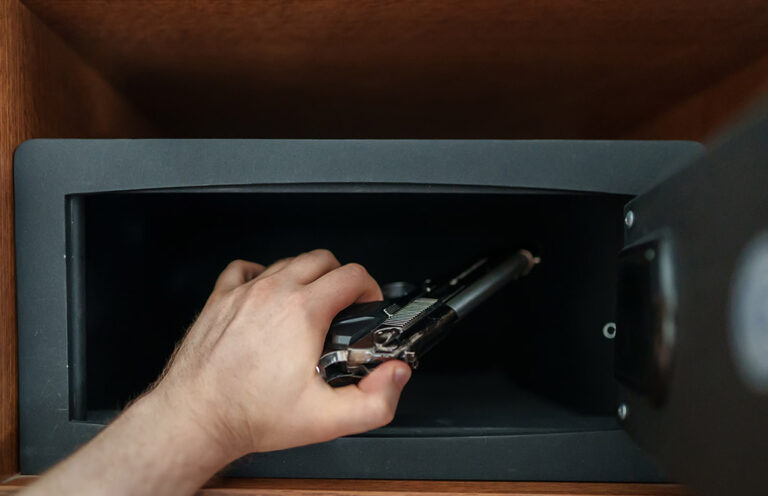
Are you always accountable for your guns? Here we look at a tragic case to gain insights into responsible firearms storage.
As a gun owner, you’re familiar with the immense responsibility that comes with firearm safety. But what happens when your child uses your gun for tragic purposes? The case of Estate of Heck v. Stoffer grapples with this very issue, raising important questions about potential liability for the misuse of your firearm by a third-person.
The case centers around the death of Officer Eryk Heck, who was shot and killed by Timothy Stoffer, a known felon, in 1997. Timothy obtained the handgun from his parents’ residence. It was alleged that the Stoffers stored their handgun between the cushions of a chair in their bedroom. Timothy had a well-documented history of criminal activity and drug abuse. Court records detailed arrests for resisting arrest, battery and theft. Despite this troubled past, the Stoffers allegedly kept a handgun in their home, accessible to their son.
With a handgun taken from his parents’ home, fugitive felon Timothy shot and killed Allen County Police Officer Eryk Heck. Officer Heck’s estate sued Timothy’s parents, Raymond and Patricia, and their family business, Stoffer Construction, asserting liability for negligent storage of the firearm in a way that afforded Timothy access to it. The Stoffers argued that they did not show Timothy where the gun was hidden.
The question then focused on whether leaving a loaded handgun in a hidden—but accessible—location was reasonable under these facts.
The trial court and Court of Appeals both held that the plaintiff’s complaint did not state a cause of action upon which relief could be granted. These courts ruled that the parents had no legal duty to secure the gun in a way that would prevent their son from accessing it, but the Indiana Supreme Court disagreed and reversed, sending the case back to the trial court.
The high court argued that the Stoffers’ knowledge of their son’s violent tendencies created a “special relationship” that imposed a duty to act reasonably to prevent him from acquiring the gun. The Indiana legislature eventually passed legislation in response to this case via Indiana Code § 34-30-20-1, which protects gun owners from being sued (held civilly liable) if someone else uses their gun in a crime, but only if the other person obtained the gun unlawfully, i.e., through burglary, robbery, theft, etc.
Nevertheless, there are some important lessons to be learned from this fact scenario.
Duty of Care for Firearms
The case establishes that, in some instances, parents may have a legal duty to secure firearms in a way that prevents them from falling into the hands of unauthorized persons with a propensity for violence. This duty arises primarily from the knowledge of the other person’s dangerous tendencies.
Gun Safety is Paramount
The case underscores the importance of responsible gun ownership. It highlights the potential legal consequences of failing to take reasonable precautions to prevent minors or dangerous individuals from accessing firearms. A more recent example can be found in the cases involving Jennifer and James Crumbley, both of whom were found guilty of involuntary manslaughter for their son’s involvement in the 2021 school shooting at Oxford High School in Michigan. These are extreme examples, but they highlight potential legal consequences for unsafe storage of firearms.
Focus on Safe Storage
These sorts of outcomes illustrate the importance of proper gun storage solutions, such as trigger locks, gun safes, and keeping ammunition separate from firearms. Even though I do not advocate laws that require safe storage of firearms, I believe it is essential for responsible gun owners to store their firearms in a way that keeps them out of the hands of unauthorized individuals. The more people act responsibly, the less fodder lawmakers have to enact more gun control laws. Don’t make it easy for criminals to contribute to the roughly 340,000 stolen firearms every year.
Not a Blanket Rule
It’s crucial to understand that Estate of Heck v. Stoffer does not establish a universal parental liability for all gun accidents involving the use of your firearm by a third-party. The court’s decision hinged on the specific facts of the case, particularly the parents’ awareness of their son’s violent tendencies. Nevertheless, it highlights the danger of storing firearms in non-secure locations and the potential legal liability that one might face for unsafe storage. These laws will vary state to state, but no matter the law, securing your firearm when not in your possession is essential to responsible gun ownership.
Disclaimer: This article is for informational purposes only and should not be construed as legal advice. Every state has its own gun laws, and it’s recommended that you consult with an attorney to understand the specific legalities around gun storage and parental responsibility in your jurisdiction.
Editor’s Note: This article originally appeared in the June 2024 issue of Gun Digest the Magazine.
More Knowledge For The Armed Citizen:


Next Step: Get your FREE Printable Target Pack
Enhance your shooting precision with our 62 MOA Targets, perfect for rifles and handguns. Crafted in collaboration with Storm Tactical for accuracy and versatility.
Subscribe to the Gun Digest email newsletter and get your downloadable target pack sent straight to your inbox. Stay updated with the latest firearms info in the industry.





